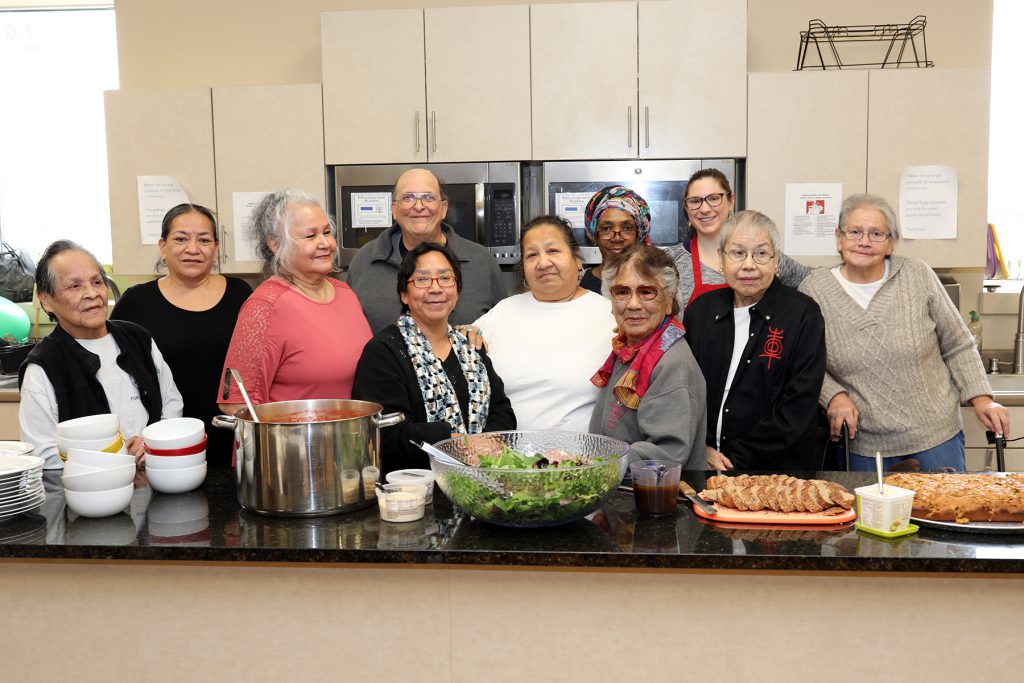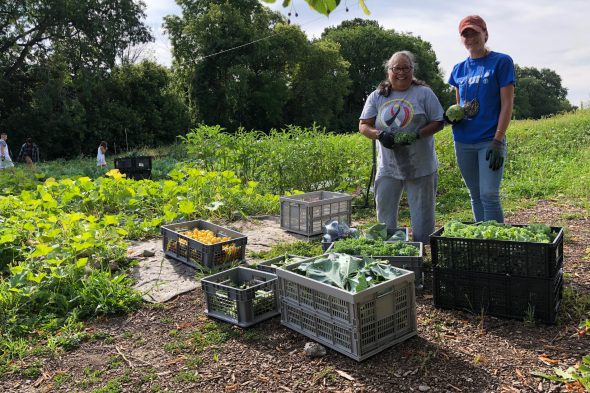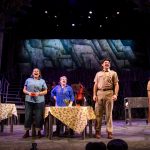Why We Take Care of Our Elders
They are ‘wisdom keepers,’ who pass down our Native American culture.

The WOLFE Group gathers for one of its regular healthy meals before COVID-19. Photo provided by Gerald L. Ignace Indian Health Center/NNS.
The primary author, Jeremiah Wayman (top), is the director of marketing and communications at Gerald L. Ignace Indian Health Center, or GLIIHC. Also contributing to this piece were Dona Yahola (middle), a case manager at GLIIHC and Jessica Martinez (bottom), a community health worker at GLIIHC.
The definition of heritage has been passed down as a tradition over time, like a seed from the past. In Native American cultures, those responsible for passing down those traditions to future generations are our elders — the wisdom keepers.
These wisdom keepers can take on many roles, with the term “elder” being earned for various reasons: keepers of cultural knowledge; leaders in the community; positive role models for younger generations; persons guiding education, business, spiritual ceremonies; those who positively impact the strength and future of their community.
For many Natives, the respect for one’s elders is born at home. With large family circles, the connection to that heritage has many pathways, whether that be through one’s grandparents, aunts or uncles.
For Dona Gilane Yahola, Ojibwe and Oneida, as well as GLIIHC case manager, those connections were built at a young age, with conversations over meals allowing her to listen and absorb experiences and knowledge from her elders in the Milwaukee community.
With the stature and importance of elders within Native cultures being held in high regard, it’s imperative for those around them to make sure they have the support they deserve. It was around early 2004 that Pat Delgado, program coordinator of the Indian Council at the time, and Dr. Linda Cieslik, health coordinator for the Department of Aging, in collaboration with the Gerald L. Ignace Indian Health Center, sat down and discussed how they could help improve the overall health and wellness of the elders in Milwaukee’s Native American population.
The idea of physical activity and healthy eating seemed to have become increasingly difficult for our elders. The goal was thus to find a way to make both necessities more accessible. With that, Work Out Low Fat Elders, or WOLFE, was born in May 2004. The purpose of Mino Ayaa (“being well” in Ojibwe) drove a weekly gathering where elders would gather and create a healthy meal, using traditional methods when able, and also taking part in a physical activity that varied from week to week.
Yoga and Zumba were offered and tailored to the capacity and needs of the elders. WOLFE increased access to these social and heart-healthy activities for elders who may have been dealing with ailments that otherwise prevented them from participating.
Ricky, a WOLFE member since 2017, describes his experience as extremely positive, “getting turned onto different foods that I normally wouldn’t try. No fats, using natural seasonings.” He jokes about not being served fried chicken during these meal times but adds that these tended to be the best, most healthy meals that he would have all week.
Now over 16 years later, the WOLFE program continues to run strong, while evolving amidst challenging obstacles. The leadership has changed, now under the watch of Loren Rendino, registered dietitian, along with a team that is powered by community health workers dedicated to serving the Native community.
During the summer and harvest months, the program has grown to include giveaways of fresh produce from our Native Wellness Garden, operated in collaboration with UW-Extension. Just this past season, workers harvested over 790 pounds of produce for the community. With friendships made over the years, that harvest continues to grow.
When COVID-19 began to restrict access to the clinic and community interactions, there was concern that this would negatively impact what had become a part of a weekly routine for our elders. Knowing the importance of these meals and healthy activity, the team came up with the plan to continue preparing weekly meals, but instead offering them either by pick-up or delivery.
While WOLFE members do miss the “comradery, conversation,” says Becky, a WOLFE member since 2019, there is still an appreciation for the guidance each meal provides on how to eat healthy consistently.

Gerald L. Ignace Indian Health Center harvests fresh produce in its Native Wellness Garden. Photo provided by Gerald L. Ignace Indian Health Center/NNS.
Yvonne, a member since 2014, appreciates the weekly deliveries, as well as biweekly phone calls for health checks, offering opportunities to converse with other WOLFE members.
Since March 18, when COVID-19 forced a pivot to its current format, the team has prepared roughly 1,000 meals for our group of elders. A previously in-person program that was reaching about 15 elders per week now routinely reaches 40-50 members in a given week.
Ricky told a story reminiscing about meals being served at his grandparents’ home as a kid. “They were very community oriented, seemed to know everyone from all walks of life, and during meal times more people just kept showing up,” Ricky said. “But somehow there was always enough food.”
The WOLFE program has been able to do the same. Along the way, the Hunger Task Force has supplied boxes of produce and shelf stable items for our members. UniteMKE chipped in with free boxes of produce as well. It seemed from week to week, more people wanted to be involved in keeping our community fed and healthy.
Could this reach and impact have been predicted when Patsy Delgado and Dr. Cieslik put this together back in 2004? Maybe.
But as we celebrate Native American Heritage Month, it is important to remember what matters is the “why.” It is to help provide our elders, our heritage, our traditions, our living DNA, our wisdom keepers with a way to help them eat healthier, pay more attention to “being well,” and hopefully, ensure they are around a little while longer to share with us the traditions that were passed down to them.
This story was originally published by Milwaukee Neighborhood News Service, where you can find other stories reporting on fifteen city neighborhoods in Milwaukee.
Op-Ed
-
Wisconsin Candidates Decry Money in Politics, Plan to Raise Tons of It
 Dec 15th, 2025 by Ruth Conniff
Dec 15th, 2025 by Ruth Conniff
-
Trump Left Contraceptives to Rot; Women Pay the Price
 Dec 8th, 2025 by Dr. Shefaali Sharma
Dec 8th, 2025 by Dr. Shefaali Sharma
-
Why the Common Council’s Amended Budget is Good Policy for Milwaukee
 Nov 20th, 2025 by Alds. Marina Dimitrijevic and Russell W. Stamper, II
Nov 20th, 2025 by Alds. Marina Dimitrijevic and Russell W. Stamper, II






















